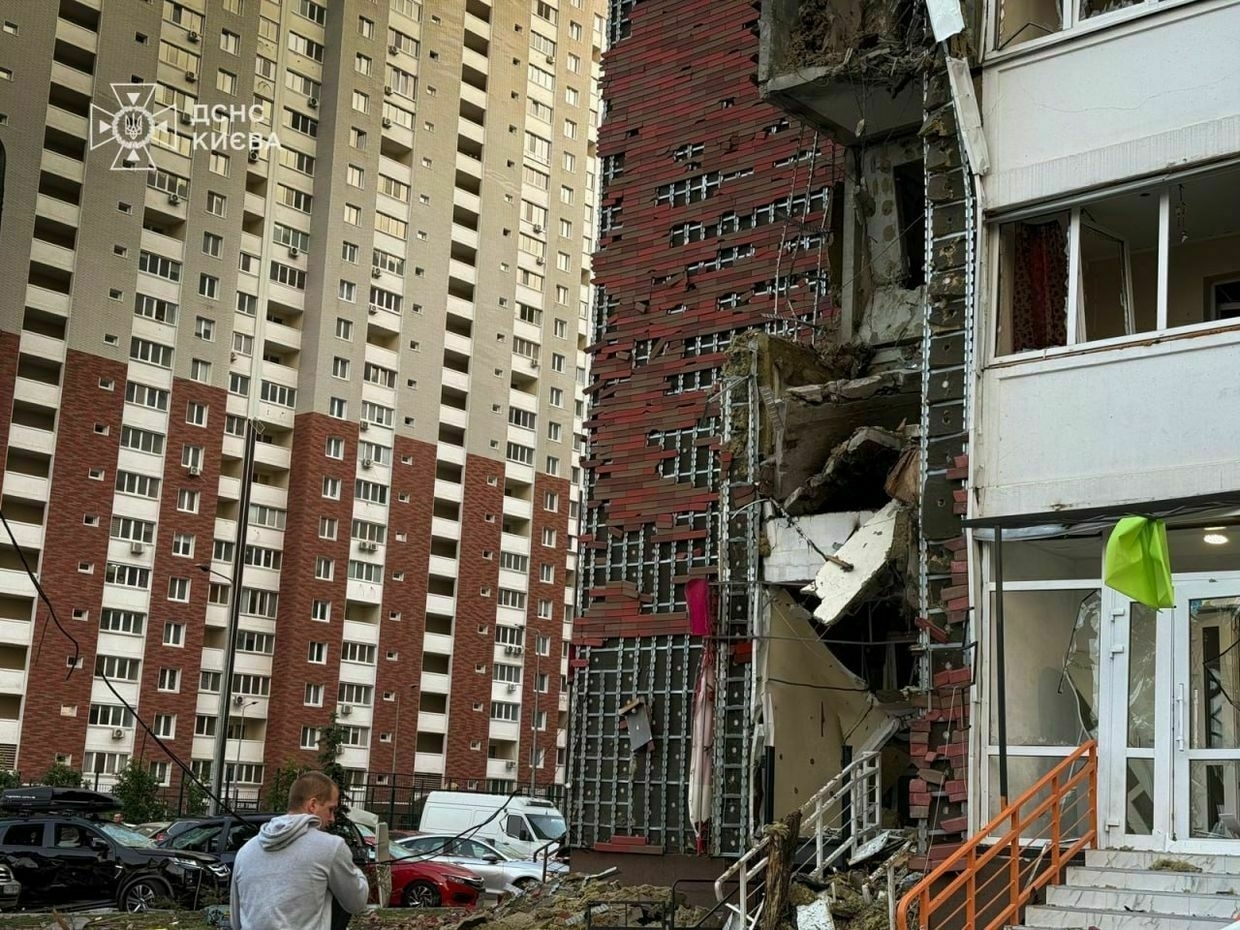
Key developments on June 10:
- In one of largest attacks on Ukraine’s capital, Russian barrage hits Kyiv, Odesa, kills 3, injures 12
- Ukraine, Russia conduct second prisoner swap under Istanbul deal
- Russia significantly improved North Korea’s shoddy KN-23 ballistic missiles, Ukraine’s Budanov says
- EU unveils 18th package of sanctions against Russia, targeting energy, banking, oil
- Over 40% of Ukrainians willing to compromise on ‘de facto’ recognition of Russian occupation for peace, poll shows
Kyiv and Odesa came under another mass Russian attack in the early hours of June 10, involving ballistic missiles and drones.
Russia launched 315 Shahed-type attack drones and decoys against Ukraine overnight, as well as two North Korean KN-23 ballistic missiles and five Iskander-K cruise missiles, primarily targeting Kyiv, the Air Force reported.
Ukrainian air defenses shot down all seven missiles and 213 attack drones. According to the statement, 64 drones disappeared from radars or were intercepted by electronic warfare systems.
A woman was killed and four other people were injured in Kyiv, according to local authorities. Meanwhile, in the southern city of Odesa, two men were killed and at least eight civilians were wounded in the attack. One more person suffered shock during the attack on Odesa, authorities reported.
According to President Volodymyr Zelensky, the attack was one of the largest on Kyiv during the full-scale war.
“Russian missile and Shahed strikes drown out the efforts of the United States and others around the world to force Russia into peace,” he wrote on X.
“For yet another night, instead of a ceasefire, there were massive strikes with Shahed drones, cruise and ballistic missiles."
 The Kyiv IndependentKateryna Denisova
The Kyiv IndependentKateryna Denisova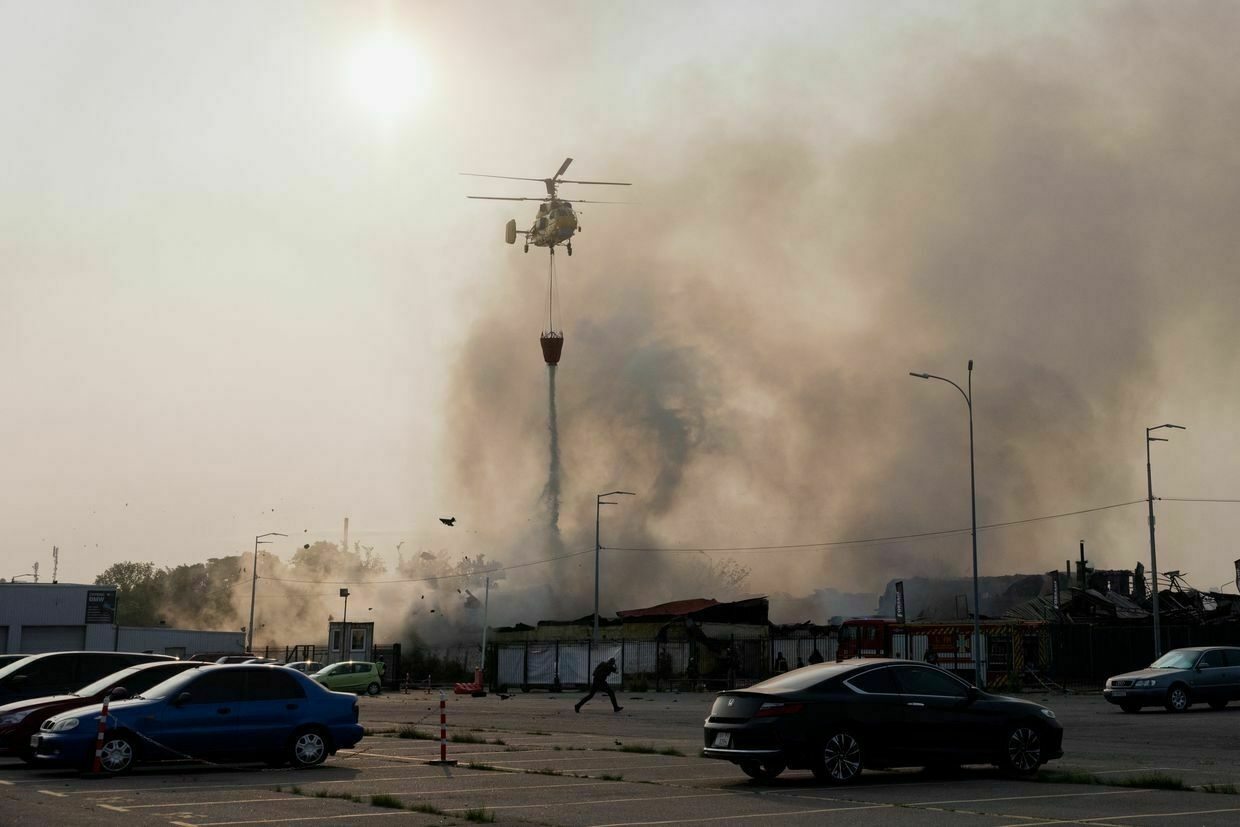
According to Culture Minister Mykola Tochytskyi, the strike also damaged St. Sophia Cathedral in Kyiv. The UNESCO World Heritage site, dating back to the 11th century, is one of Ukraine’s most significant religious and cultural landmarks.
The management of St. Sophia Cathedral has informed UNESCO about the damage caused to the historic site by a recent Russian airstrike, according to the reserve’s general director, Nelia Kukovalska. Speaking to Suspilne, she said that the blast wave damaged the cornice of the cathedral’s central apse.
In Odesa, a film studio and medical facilities, including a maternity hospital, were damaged.
A Russian attack caused damage to a maternity hospital in Odesa. At the time of the attack, 85 adults and 22 children were inside, but no staff or patients were injured as everyone was in the shelter, facility director Iryna Golovatyuk-Yuzefpolskaya told Suspilne.
Ukraine, Russia conduct second prisoner swap under Istanbul deal
Ukraine and Russia carried out another prisoner exchange on June 10, concluding the second phase of an agreement reached during the most recent round of peace talks in Istanbul, President Volodymyr Zelensky announced.
"We continue the return of our people, as agreed in Istanbul," Zelensky wrote on X, confirming the exchange without immediately disclosing the number of returnees.
"Today marks the first stage of the return of our injured and severely wounded warriors from Russian captivity. All of them require immediate medical attention. This is an important humanitarian act," he added.
The Coordination Headquarters for the Treatment of Prisoners of War said the second group of released prisoners includes personnel from Ukraine's Navy, Ground Forces, National Guard, Unmanned Systems Forces, Air Assault Forces, Border Guard Service, Territorial Defense, and State Special Transport Service.
Ukraine managed to release officers, soldiers, and non-commissioned officers. Among the freed Ukrainian soldiers are those who are seriously ill, as well as those who defended the city of Mariupol in Donetsk Oblast and spent more than three years in captivity.
"All of the defenders released today have severe injuries and serious illnesses: amputated limbs, vision problems, abscesses, infections, trauma, shrapnel wounds, and chronic diseases. Some of the liberated have been diagnosed with hepatitis and tuberculosis," the headquarters' statement read.
The Russian Defense Ministry also said that it had received a second group of Russian prisoners of war who are now in Belarus. Moscow did not disclose the exchange details or the number of returnees.
The swap marks the second stage of the deal negotiated during the June 2 negotiations in Turkey — the second direct peace dialogue between Kyiv and Moscow since 2022.
Russia significantly improved North Korea's shoddy KN-23 ballistic missiles, Ukraine's Budanov says
Russia helped significantly improve North Korea's KN-23 ballistic missiles, also known as Hwasong-11, after receiving the first inaccurate batch from Pyongyang, Kyrylo Budanov, Ukraine's military intelligence (HUR) chief, said in an interview with The War Zone published on June 9.
North Korea has supplied Russia with ammunition, ballistic missiles, and soldiers since the beginning of the full-scale invasion.
KN-23 ballistic missiles initially flew with a deviation of a few kilometers and around half fired at Ukraine by Russia malfunctioned and exploded in mid-air, Reuters reported in May 2024, citing Ukraine's Prosecutor General's Office.
But now they are hitting their targets, Budanov said, without specifying what exactly was changed in the North Korean missiles.
"The KN-23 missiles that were delivered in the very beginning, now it's an absolutely different missile in (terms) of their technical characteristics. The accuracy has increased many times," Budanov said.
"This is the result of the common work of Russian and North Korean specialists. Also, there is the modernization of long-range air-to-air missiles, particular technologies on submarines, and unfortunately, ballistic missiles, which can carry nuclear payloads," he added.
According to Budanov, Russia has also agreed to help North Korea begin domestic production of Shahed-type kamikaze drones.
Pyongyang has ratcheted up its support for Russia following Russian President Vladimir Putin's signing of a mutual defense pact with North Korean leader Kim Jong Un in June 2024.
 The Kyiv IndependentAsami Terajima
The Kyiv IndependentAsami Terajima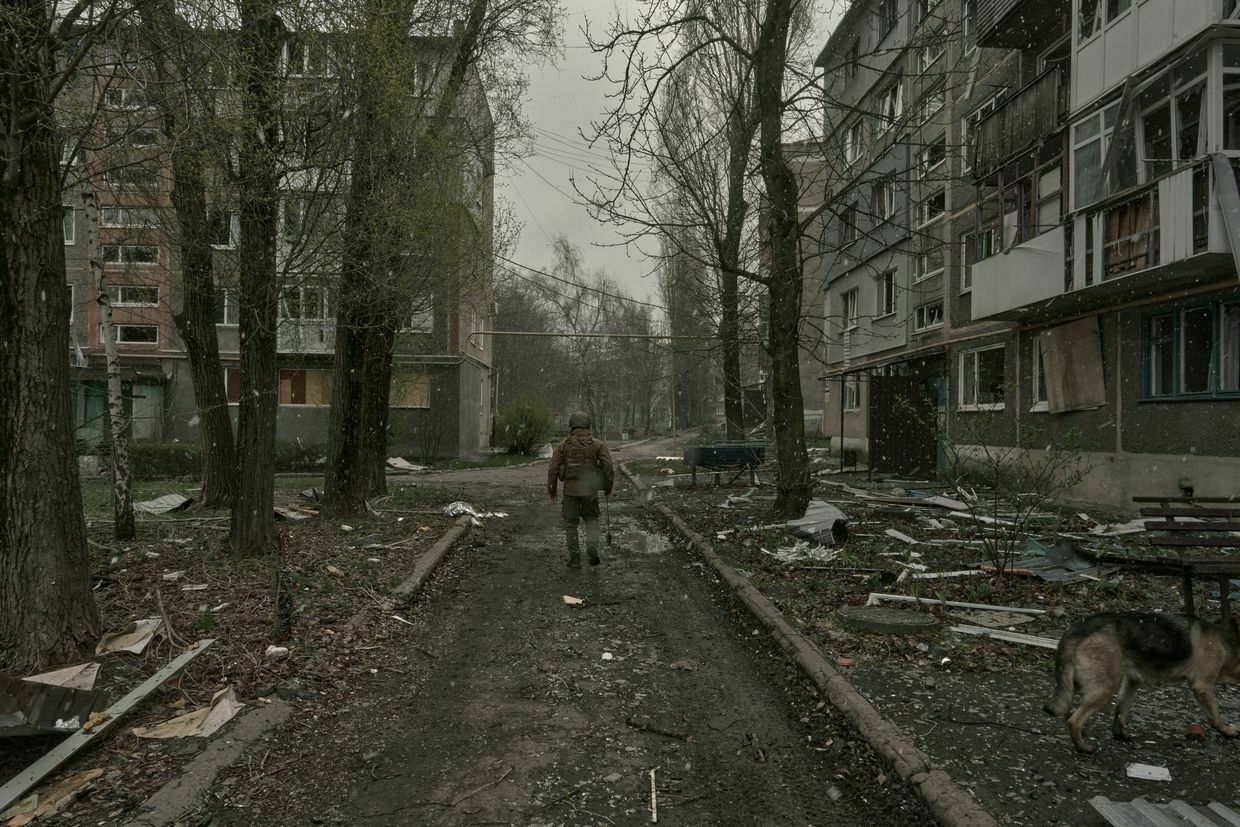
EU unveils 18th package of sanctions against Russia, targeting energy, banking, oil
The 18th package of European Union sanctions against Russia will include additional restrictions on energy, banking, oil, and other areas, European Commission President Ursula von der Leyen announced on June 10.
After the 17th package of sanctions against Russia came into effect on May 20, Ukraine's allies announced that the next package of restrictions was already in the works, after Moscow repeatedly refused to accept a ceasefire.
Russian troops also continue to advance slowly along the front line, approaching Ukraine's Dnipropetrovsk Oblast and moving deeper into Sumy Oblast.
"Russia's goal is not peace," von der Leyen said. "Strength is the only language that Russia will understand."
The EU has proposed for the first time a ban on transactions involving the Nord Stream 1 and Nord Stream 2 pipelines, as well as a reduction in the oil price cap from $60 to $45 per barrel, as one-third of Russia's government revenue still comes from oil exports, according to von der Leyen.
Von der Leyen added that the amendments to the oil price cap are a Group of Seven (G7) coalition measure, so it will be discussed at the G7 summit to be held on June 15-17 in Kananaskis County, located in the western province of Alberta, Canada.
The EU will also add 77 more shadow fleet vessels to comply with the cap to prevent Russia from circumventing sanctions and propose imposing a ban on imports of petroleum products made from Russian oil.
Another part of the sanctions will be aimed at the Russian banking sector, with the EU wanting to add 22 more Russian banks to the list of those who can no longer use the SWIFT international system.
The EU also proposes to extend the ban on transactions to financial operators in third countries that finance trade with Russia, bypassing sanctions, and to impose limitations on the Russian Direct Investment Fund, its subsidiaries, and investment projects.
Further EU restrictive measures will include a ban on exports worth more than 2.5 billion euros ($2.8 billion), which must deprive the Russian economy of critical technologies and industrial goods, von der Leyen said.
Machinery, metals, plastics, and chemicals used as raw materials for industry, as well as dual-use goods involved in the production of weapons and drones, will be affected, according to von der Leyen.
The European Commission President also emphasized that the EU wants its sanctions to be more effective. Thus, the EU would list another 22 Russian and foreign companies, including those from China and Belarus, providing direct or indirect support to Russia's military and industrial complex. These additions will bring the total number of sanctioned companies to over 800.
EU countries will start debating the proposal this week.
 The Kyiv IndependentWojciech Jakóbik
The Kyiv IndependentWojciech Jakóbik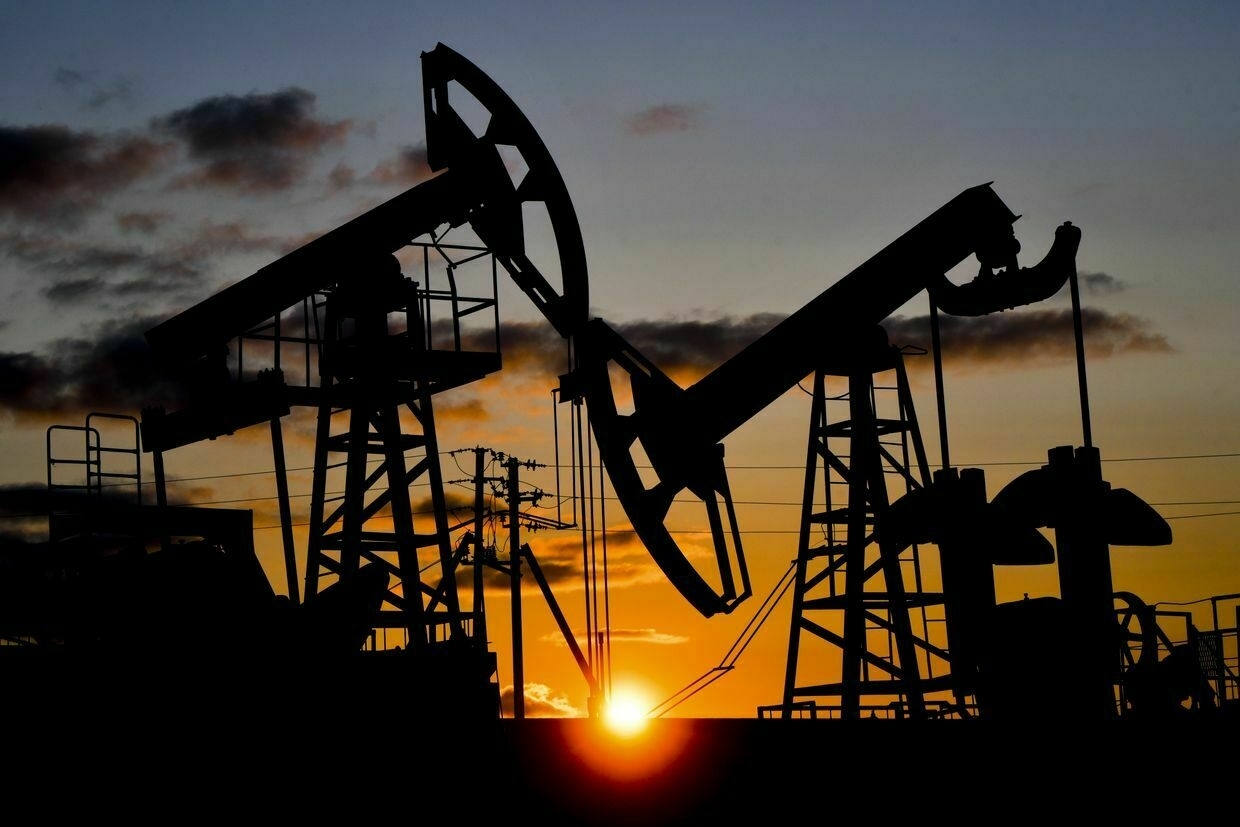
Over 40% of Ukrainians willing to compromise on 'de facto' recognition of Russian occupation for peace, poll shows
Some 48% of Ukrainians "categorically" oppose even a de facto recognition of Russian control of the occupied Ukrainian territories to achieve peace, according to a poll by the Kyiv International Institute of Sociology (KIIS) published on June 10.
In turn, 43% of respondents said they would be willing to make the concession to reach a peace deal with Moscow, provided it does not include a formal, or de jure, recognition of the Russian control.
The news comes as Russia continues to push for territorial concessions from Ukraine as part of the ongoing peace talks.
The survey suggests that Ukrainians are even less ready to accept a de jure recognition of the Russian occupation – 68% of respondents said they are categorically against such a step, while 24% were open to it if it leads to peace.
The strongest opposition – 78% – was against handing over control of Ukrainian territories that Russia does not currently occupy. Only 15% of respondents were willing to make that compromise.
Russia currently occupies roughly 20% of Ukraine's territory. This includes the whole of Crimea occupied in 2014 and large parts of the Donetsk, Luhansk, Zaporizhzhia, and Kherson oblasts.
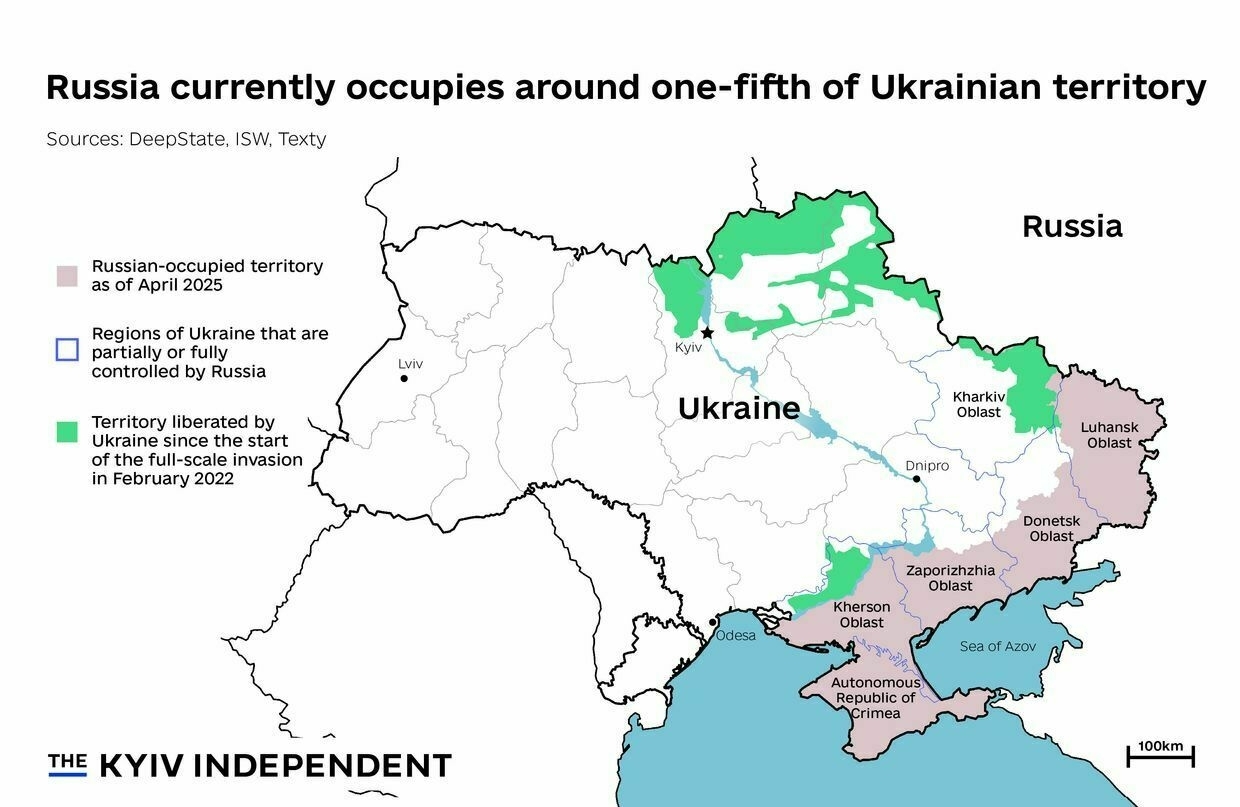
Moscow illegally declared the annexation of the latter four regions in 2022 and insists on Ukraine's full withdrawal from them as part of a peace deal, even though it does not control them completely.
The Kremlin is also pushing for a formal recognition of its hold over Ukrainian territories. While U.S. President Donald Trump has reportedly signalled a willingness to U.S. recognition of the Russian occupation of Crimea, Ukraine has rejected the step, as well as its withdrawal from the territory it currently holds.
The poll revealed that public opinion on territorial concessions has remained relatively stable over the past months.
When asked whether Ukraine should give up territories to achieve peace — without specifying a de facto or de jure recognition of the Russian occupation — 52% said Ukraine should not take the step under "any circumstances."
In comparison, 38% of respondents backed the compromise. These are almost the same figures as in December 2024, when 51% were opposed to the concession, while 38% were open to it.
"Our survey shows that the issue of territorial losses is extremely sensitive for Ukrainians and, in particular, how exactly 'territorial losses' are interpreted plays a significant role," said Anton Hrushetskyi, executive director of KIIS, in a statement.
"At the same time, this means that (un)readiness for territorial losses can become the subject of manipulation and information campaigns against Ukraine."
The poll was conducted between May 15 and June 3. It involved 2,004 adult residents of the Ukrainian-controlled territories who were interviewed by telephone. Only about 500 of them answered all four questions.
Note from the author:
Ukraine War Latest is put together by the Kyiv Independent news desk team, who keep you informed 24 hours a day, seven days a week. If you value our work and want to ensure we have the resources to continue, join the Kyiv Independent community.

